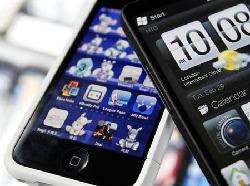Apple is one participant in a web of litigation among phone makers and software firms over who owns the patents used in smartphones, as rivals aggressively rush into the smartphone and tablet market that the US firm jumpstarted with the iPhone and iPad.
Nokia has also sued Apple, which in turn has sued Taiwanese handset maker HTC.
Samsung is one of the fastest growing smartphone makers and has emerged as Apple's strongest competitor in the booming tablet market with models in three sizes, but it remains a distant second in the sector.
Its Galaxy products use Google's Android operating system, which directly competes with Apple's mobile software. However, Apple's claims against Samsung focus on Galaxy's design features, such as the look of its screen icons, the lawsuit said.
John Jackson, an analyst with CCS Insight, said Samsung is essentially Apple's only real tablet competitor at this stage. "It's clear that they do not intend to let Apple run away with the category," Mr Jackson said.
The lawsuit, filed on Friday, alleges Samsung violated Apple's patents and trademarks.
"This kind of blatant copying is wrong," Apple spokeswoman Kristin Huguet said in a statement.
Samsung said it would respond to the legal action "through appropriate legal measures to protect our intellectual property".
"Samsung's development of core technologies and strengthening our intellectual property portfolio are keys to our continued success," it said in a statement.
Steve Jobs, Apple chief executive, has criticised Samsung and other rivals in presentations of new products or technology debates. Analysts say Samsung's response to this has been muted, partly because Apple was Samsung's second-biggest customer last year after Sony.
Apple brought in around 6.2 trillion won (£3.5bn) of sales to Samsung in 2010 mainly by purchasing semiconductors, according to Samsung's annual report.
"This is more like a symbolic move by Apple that it is quite serious about rivals advancing and it is trying to hold back its close competitors," said John Park, an analyst at Daishin Securities in Seoul. "Samsung is unlikely to respond aggressively given that Apple is its core client in the component business."
To better compete with Apple, Samsung redesigned within weeks its new 10.1-inch tablet, first introduced in February, to make it the thinnest in the category after Apple set the trend with its iPad 2.
The global smartphone market is expected to grow 58pc this year and Android is set account for 39pc of the market, while the tablet market is likely to quadruple to 70m units, according to research firm Gartner.


